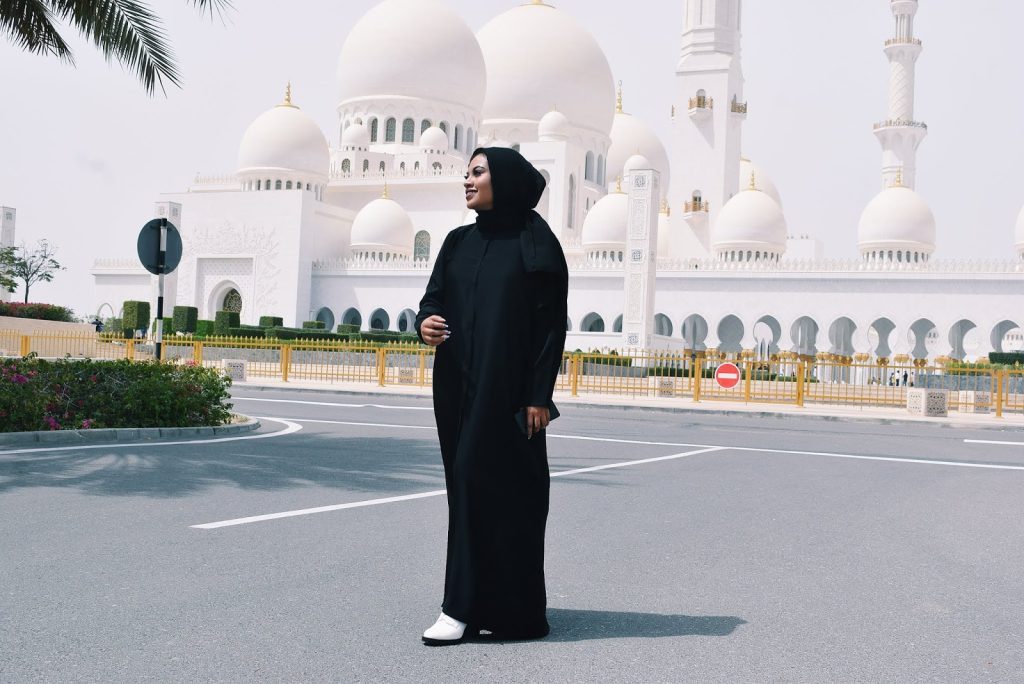Abu Dhabi is a modern, diverse city, but public attire still reflects Islamic cultural values. Tourists are not required to wear traditional Emirati clothing, yet modesty is expected in most public places. This generally means covering shoulders, cleavage, and knees for women, and avoiding sleeveless shirts or very short shorts for men. At malls, government offices, and historical landmarks, dressing respectfully is more than politeness—it’s part of social etiquette.
Swimwear is only acceptable at beaches and pools
Bikinis, swim trunks, and beachwear are acceptable at hotel pools, beach clubs, and water parks, but not outside those settings. Walking through hotel lobbies or into restaurants in swimwear, even with a towel, is frowned upon. Women can wear one- or two-piece swimsuits, and men may wear standard trunks or shorts, but thong bottoms or topless sunbathing is strictly prohibited. Once you leave the pool area, cover up with a dress, kaftan, or T-shirt and shorts.
Mosques and religious sites require full coverage
If you plan to visit the Sheikh Zayed Grand Mosque or any other religious site, your clothing must adhere to specific requirements. Women are expected to wear loose-fitting, ankle-length clothing and cover their hair with a scarf. Many sites provide abayas and scarves at the entrance if needed. Men should wear long trousers and avoid sleeveless shirts. Sandals are acceptable, but avoid flashy or ripped clothing. These measures aren’t arbitrary—they ensure respect for sacred spaces.
Indoor spaces are air-conditioned but dress in layers
Abu Dhabi’s summer temperatures can exceed 45°C, making lightweight fabrics ideal. However, indoor spaces like malls, cinemas, and offices use powerful air-conditioning. Many visitors find a light jacket or scarf useful, especially if they’re sensitive to temperature changes. Linen, cotton, and breathable blends work best in outdoor heat while offering coverage suitable for public places. Planning your outfit for both extremes—sun and chill—will keep you comfortable all day.
Evening wear is more flexible but still conservative
Upscale restaurants and rooftop lounges in Abu Dhabi often have dress codes. While short dresses or sleeveless tops are accepted in such venues, elegance and modesty still prevail. Men may be required to wear collared shirts or trousers. Flip-flops, sportswear, and tank tops may not be allowed in fine-dining venues or hotels. If you’re unsure, check with the venue in advance or opt for smart-casual attire to be safe. Fashion-forward is welcome, but overly revealing or flashy outfits can still raise eyebrows.

Traditional clothing is optional but appreciated
Some tourists enjoy wearing local attire like the abaya or kandura as a sign of cultural appreciation. These can be bought in markets like Madinat Zayed or found in boutique stores at malls. While locals welcome the gesture, it’s important to wear these garments respectfully. Treating them like costumes or posing mockingly in photos is deeply offensive. If you choose to try traditional wear, do so with mindfulness and curiosity, not for entertainment.
Children’s dress expectations are relaxed
For children, the dress code is generally more relaxed. However, parents should ensure that kids are decently covered when entering mosques or cultural sites. Swimwear rules apply to children as well, and most family venues encourage covering up when moving through public areas. Sun hats and light fabrics are strongly advised during outdoor activities, as younger skin is more vulnerable to heat and sunburn.
Shopping centers display dress reminders
Most malls and public venues in Abu Dhabi display signage at entrances reminding visitors to dress modestly. These signs are not just recommendations—they reflect the cultural tone of the city. Security staff may politely remind guests to adjust their attire if it’s considered inappropriate. While enforcement is respectful, compliance is expected. Knowing this beforehand helps you pack accordingly and avoid awkward moments.
Business attire follows global standards with local touches
For those attending meetings or business events, formal Western attire is widely accepted. Men typically wear suits or button-down shirts with trousers. Women can wear dresses, blouses, or pantsuits, but should avoid sheer fabrics and deep necklines. For higher-level government or cultural meetings, covering arms and legs is considered professional. Some expats also keep a scarf in their bag just in case they visit a more conservative venue during the workday.
Dressing well shows cultural understanding
The way you dress in Abu Dhabi influences how you’re perceived. Dressing neatly and modestly not only helps you avoid unwanted attention but also shows that you respect the norms of the place you’re visiting. Emiratis are generally warm and hospitable, especially when visitors make an effort to understand and adapt. With a little planning, your wardrobe can help you blend in comfortably and confidently in every setting.
This guide was prepared by www.few.ae team, using verified cultural etiquette insights and current practices in Abu Dhabi.
